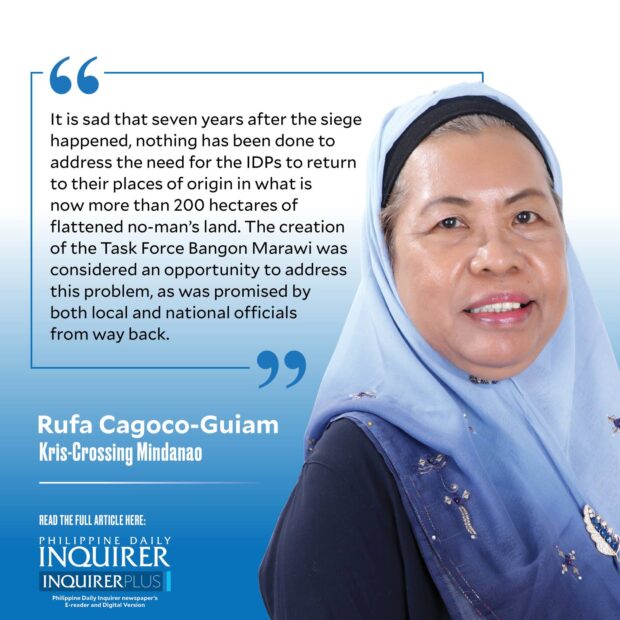
New Year 2024 has ushered in a bleaker future for the community of internally displaced persons (IDPs) who had been forced to migrate out of their original residences as a result of the five-month relentless bombing there in 2017.
This is the seventh year after the Marawi siege, and so far, the IDPs there are still in dire straits than ever before.
At about the same time last year, a group of women IDPs approached me to share their plight in the “temporary” shelters they were allowed to stay in for more than three years in Sagonsongan, a barangay in Marawi City. They told me that they were given just one week to vacate the shelters there since the lease on the land where the shelters were built was about to expire at the end of 2022. They complained that the Marawi City local government unit was the agency that issued this order. A well-connected Meranaw leader who owns the land has demanded that the Marawi local government impose the eviction of the “overstaying” occupants of the shelters. At that time, this group of Marawi women IDPs already called themselves “bakwit forever” (forever IDPs)—being displaced has been like a “sustainable” lifestyle for them since they were uprooted from their homes due to the infamous 2017 Marawi siege.
Now some of these people are facing the same problem. A few of the IDPs who have nowhere to go found an opportunity to stay at some of the uninhabited units of the “permanent shelters” built by UN-Habitat in Barangay Kilala sometime after the Marawi siege. These units were turned over to the Marawi government for management. But because of the long bureaucratic process that people have to go through to access these units, many of them were unable to do so, consequently making some units look like abandoned shelters.
But last week, some Philippine army soldiers accompanied local housing authorities coming from the Marawi government to order them to vacate the permanent housing units in Barangay Kilala. Now they will again go through another episode of evacuation, and many of them have nowhere to go. They were given until 5 p.m. Monday, before they would be forcibly evacuated from the buildings they had been occupying.
It is sad that seven years after the siege happened, nothing has been done to address the need for the IDPs to return to their places of origin in what is now more than 200 hectares of flattened no-man’s land. The creation of the Task Force Bangon Marawi (TFBM) was considered an opportunity to address this problem, as was promised by both local and national officials from way back. Some nice structures have indeed been put in place in Marawi, but these are not what the IDPs wanted; these are not usable for them as residential units. In fact, these structures are meant to be “show windows” to deceive outsiders that the previous administration of Rodrigo Duterte had complied with his promise to make “Marawi rise again,” through the TFBM.
Just before Duterte stepped down as president, he signed Republic Act No. 11696, creating the Marawi Compensation Board. It was hailed as the instrument to help heal the wounds brought by the Marawi siege, and allow a peaceful transition for the victims after being provided with financial assistance once their claims have been verified and approved. As of December 2023, the board reported it has awarded as much as P350,000 in death claims.
I wonder if the IDPs now facing forcible eviction from the permanent shelters have access to these claims or claims for their damaged houses in the most affected areas? If so, why are these people still suffering from being displaced, homeless, and impoverished?
The Marawi siege was a knee-jerk reaction to some unverified reports that Marawi City would become a territory of the IS-inspired Maute group. Duterte decided to bomb Marawi while in Russia, and at that time surrounded by close confidantes, among them his former man Friday, who has become one of the top senators by the number of votes he garnered in the 2019 elections. There is so much to know about why Duterte went ahead with such a decision, without consulting with military advisers who had more situational intelligence about the location of the Maute terrorists. The Marawi siege could have been averted, if the military intelligence units had conducted a more strategic and targeted surgical type of operations against the Maute.
But this did not happen, leading to the present crisis facing the IDPs there now. I wonder how President Marcos will address this problem, or if he will ever address it. I know this is not a priority in his administration, both in his political plans, if any, or in the 2024 budget he just approved.
Comments to rcguiam@gmail.com

